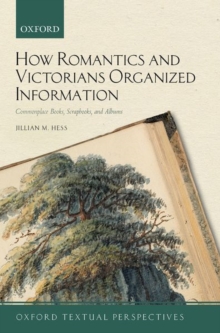Description
| Product ID: | 9780192896070 |
| Product Form: | Paperback / softback |
| Country of Manufacture: | GB |
| Series: | Oxford Textual Perspectives |
| Title: | How Romantics and Victorians Organized Information |
| Subtitle: | Commonplace Books, Scrapbooks, and Albums |
| Authors: | Author: Jillian M. Hess |
| Page Count: | 336 |
| Subjects: | Literary studies: c 1800 to c 1900, Literary studies: c 1800 to c 1900 , Literary studies: fiction, novelists and prose writers, Material culture, Literary studies: fiction, novelists & prose writers, Material culture, England, c 1800 to c 1900 |
| Description: | This volume studies an important manuscript form of nineteenth-century England: the commonplace book and its descendent, the scrapbook. It explores the tradition of managing information in nineteenth-century England and excavates notes and drafts of the most important works in Romantic and Victorian literature. Every literary household in nineteenth-century Britain had a commonplace book, scrapbook, or album. Coleridge called his collection "Fly-Catchers", while George Eliot referred to one of her commonplace books as a "Quarry," and Michael Faraday kept quotations in his "Philosophical Miscellany." Nevertheless, the nineteenth-century commonplace book, along with associated traditions like the scrapbook and album, remain under-studied. This book tells the story of how technological and social changes altered methods for gathering, storing, and organizing information in nineteenth-century Britain. As the commonplace book moved out of the schoolroom and into the home, it took on elements of the friendship album. At the same time, the explosion of print allowed readers to cheaply cut-and-paste extractions rather than copying out quotations by hand. Built on the evidence of over 300 manuscripts, this volume unearths the composition practices of well-known writers such as Samuel Taylor Coleridge, Sir Walter Scott, George Eliot, and Alfred Lord Tennyson, and their less well-known contemporaries. Divided into two sections, the first half of the book contends that methods for organizing knowledge developed in line with the period''s dominant epistemic frameworks, while the second half argues that commonplace books helped Romantics and Victorians organize people.Chapters focus on prominent organizational methods in nineteenth-century commonplacing, often attached to an associated epistemic virtue: diaristic forms and the imagination (Chapter Two); "real time" entries signalling objectivity (Chapter Three); antiquarian remnants, serving as empirical evidence for historical arguments (Chapter Four); communally produced commonplace books that attest to socially constructed knowledge (Chapter Five); and blank spaces in commonplace books of mourning (Chapter Six). Richly illustrated, this book brings an archive of commonplace books, scrapbooks, and albums to the reader. |
| Imprint Name: | Oxford University Press |
| Publisher Name: | Oxford University Press |
| Country of Publication: | GB |
| Publishing Date: | 2022-08-04 |


